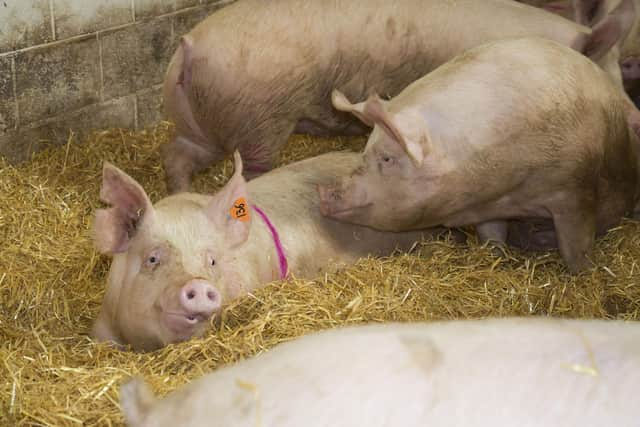Close the gate to respiratory problems with PRRS vaccination in your pigs


“The PRRS virus acts as a gateway to a whole host of bacterial respiratory diseases,” explains Maureen Prendergast, Technical Manager at MSD Animal Health. “If PRRS infection occurs in young pigs, the suppression of their immunity can be immense and we often see Mycoplasma, Strep. suis, Enzootic pneumonia (APP) and Glasser’s disease following on throughout the growing and finishing phases.”
PRRS (Porcine Respiratory and Reproductive Syndrome), also known as blue ear, first occurred in Europe in the early ‘90s and has an estimated herd prevalence of around 60% in the UK and Ireland. It results in significant losses due to growth retardation and immunosuppression in piglets and reproductive disorders in sows and gilts. The disease is primarily controlled through strict biosecurity and vaccination.
Advertisement
Advertisement
Even on farms that are vaccinating sows and gilts, if there is a small break in biosecurity or if the PRRS virus is present anywhere on the farm, the rest of the herd is at risk. Piglets that are not vaccinated are particularly susceptible to the disease and it can also circulate within second stage and fattener groups.


The time of weaning places considerable stress on young piglets with changes in diet, environmental challenges and declining maternal antibodies all playing a part. This causes temporary changes in gut integrity to varying levels. Right now, many farmers in Ireland are also trying to remove zinc oxide from the diet ahead of the introduction of EU legislation in June, just a few months away.
“Farmers, nutritionists and vets are working together to remove zinc oxide and reduce antibiotic usage, so as well as changes to management and diet the industry should also be looking at vaccination to help reduce the disease risk. Because PRRS is a gateway disease to so many other health issues, it makes sense to vaccinate piglets prior to weaning,” warns Dr. Prendergast. “Vaccinating piglets can stabilise nursery and early weaned pigs making them more resilient to secondary bacterial diseases.”
PRRS virus can infect up to 95% of finishing pigs reducing the effectiveness of other vaccines through immuno-suppression and simply letting other respiratory diseases skip past the innate immunity. The cost of PRRS infection to farmers varies depending on secondary infection rates, but allowing for reduced growth rates, increased mortality and reduction in FCR, it has been estimated at around £4 per pig.
Advertisement
Advertisement
Vaccination of every piglet with just a single dose of Porcilis PRRS vaccine from 14 days of age should provide immunity against the disease for the next 6 months and has been proven to result in better daily growth and feed conversion. Additional field trials in finishing pigs also demonstrated a reduction in mortality, increased price at market and a reduction in the number of animals requiring antibiotics.
Porcilis PRRS has been established for nearly 20 years and is Ireland’s best-selling PRRS vaccine (Kynetec data Jan 2022). Immunisation can be undertaken at the same time as Porcilis vaccines against three other diseases of economic importance in growing pigs, PCV2, M. hyo and Lawsonia intracellularis (ileitis). It is now possible to vaccinate against all four diseases as a single administration via intramuscular injection, or through the IDAL device from three weeks of age.
“PRRS, alongside PCV2 and Mycoplasma hyopneumoniae, plays a major role in the multifactorial Porcine Respiratory Disease Complex (PRDC), indirectly resulting in large economic losses in finishing herds. By using vaccination to ‘close the gate’ to PRRS, it’s possible to reduce the disease pressure on batches of pigs while farmers adjust to the increased challenges of reducing in-feed medication.
“Obviously, all farms will have different disease timing and severity and your vet is best placed to devise a suitable vaccination programme for your farm,” concludes Dr. Prendergast.
More Information
Advertisement
Advertisement
Further information about Porcilis PRRS is available from your veterinary practitioner, the product SPC, MSD Animal Health, Red Oak North, South County Business Park, Leopardstown, Dublin 18, Ireland or www.msd-animal-health.ie/pigs. MSD Animal Health can be contacted at: 01-2970220 or emailed at: [email protected].